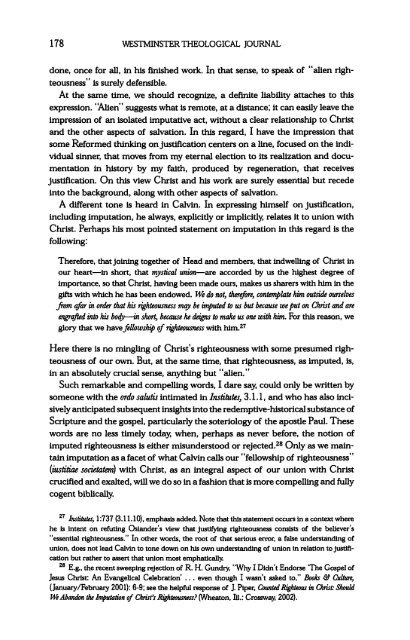NEW TESTAMENT THEOLOGY
Issues%20in%20New%20Testament%20Theology
Issues%20in%20New%20Testament%20Theology
You also want an ePaper? Increase the reach of your titles
YUMPU automatically turns print PDFs into web optimized ePapers that Google loves.
178 WESTMINSTER THEOLOGICAL JOURNAL<br />
done, once for all, in his finished work. In that sense, to speak of "alien righteousness"<br />
is surely defensible.<br />
At the same time, we should recognize, a definite liability attaches to this<br />
expression. "Alien" suggests what is remote, at a distance; it can easily leave the<br />
impression of an isolated imputative act, without a clear relationship to Christ<br />
and the other aspects of salvation. In this regard, I have the impression that<br />
some Reformed thinking on justification centers on a line, focused on the individual<br />
sinner, that moves from my eternal election to its realization and documentation<br />
in history by my faith, produced by regeneration, that receives<br />
justification. On this view Christ and his work are surely essential but recede<br />
into the background, along with other aspects of salvation.<br />
A different tone is heard in Calvin. In expressing himself on justification,<br />
including imputation, he always, explicitly or implicitly, relates it to union with<br />
Christ. Perhaps his most pointed statement on imputation in this regard is the<br />
following:<br />
Therefore, that joining together of Head and members, that indwelling of Christ in<br />
our heart—in short, that mystical union—are accorded by us the highest degree of<br />
importance, so that Christ, having been made ours, makes us sharers with him in the<br />
gifts with which he has been endowed. We do not, therefore, contemplate him outside ourselves<br />
from afar in order that his righteousness may be imputed to us but because we put on Christ and are<br />
engrafted into his body—in short, because he deigns to mah us one with him. For this reason, we<br />
glory that we have fellowship of righteousness with him. 27<br />
Here there is no mingling of Christ's righteousness with some presumed righteousness<br />
of our own. But, at the same time, that righteousness, as imputed, is,<br />
in an absolutely crucial sense, anything but "alien."<br />
Such remarkable and compelling words, I dare say, could only be written by<br />
someone with the ordo salutis intimated in Institutes, 3.1.1, and who has also incisively<br />
anticipated subsequent insights into the redemptive-historical substance of<br />
Scripture and the gospel, particularly the soteriology of the apostle Paul. These<br />
words are no less timely today, when, perhaps as never before, the notion of<br />
imputed righteousness is either misunderstood or rejected. 28 Only as we maintain<br />
imputation as a facet of what Calvin calls our "fellowship of righteousness"<br />
(iustitiae societatem) with Christ, as an integral aspect of our union with Christ<br />
crucified and exalted, will we do so in a fashion that is more compelling and fully<br />
cogent biblically.<br />
27 Institutes, 1:737 (3.11.10), emphasis added. Note that this statement occurs in a context where<br />
he is intent on refuting Osiander's view that justifying righteousness consists of the believer's<br />
"essential righteousness." In other words, the root of that serious error, a false understanding of<br />
union, does not lead Calvin to tone down on his own understanding of union in relation to justification<br />
but rather to assert that union most emphatically.<br />
28 E.g., the recent sweeping rejection of R. H. Gundry, "Why I Didn't Endorse 'The Gospel of<br />
Jesus Christ: An Evangelical Celebration' ... even though I wasn't asked to," Books & Culture,<br />
(January/February 2001): 6-9; see the helpful response of J. Piper, Counted Righteous in Christ: Should<br />
We Abandon the Imputation of Christ's Righteousness? (Wheaton, 111.: Crossway, 2002).


